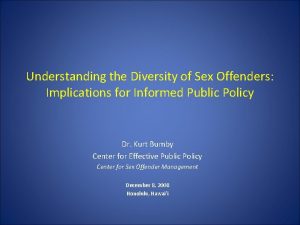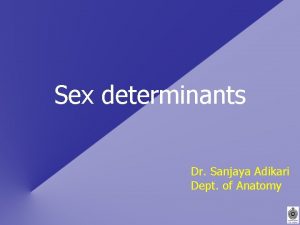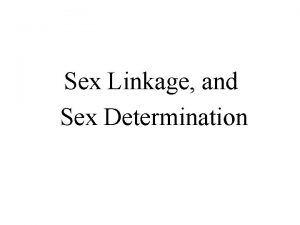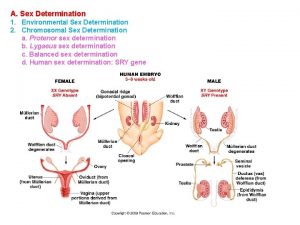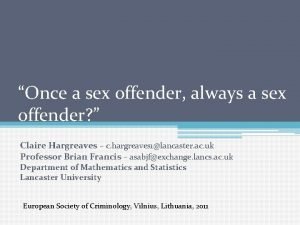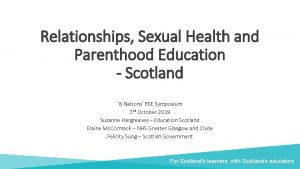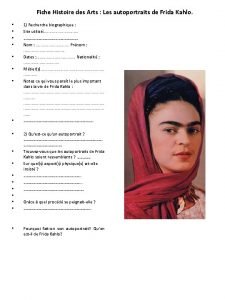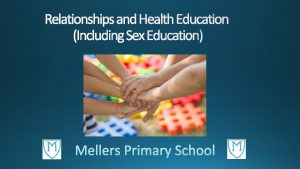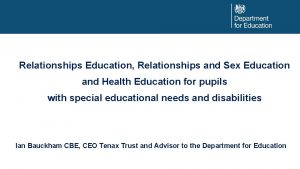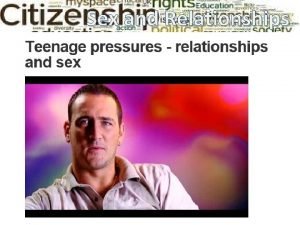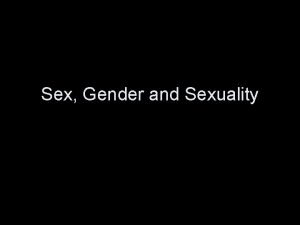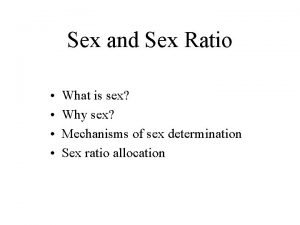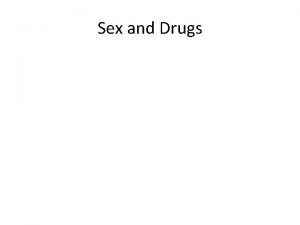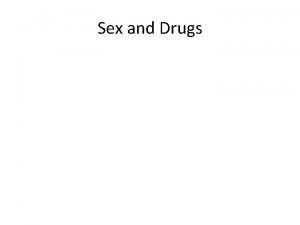Relationships and Health Education Including Sex Education Parents













- Slides: 13

Relationships and Health Education, Including Sex Education Parents / Carers Meeting Tuesday 18 th May 2021 Aims of this meeting: • To introduce the new relationships and health education curriculum at Garfield why it is important. • To answer some frequently asked questions from parents about the new curriculum. • To show the curriculum objectives and resources for sex education lessons in year 6 that will be taught later this term. • To explain how a parent / carer in year 6 can withdraw their child from sex education lessons, if they wish to do so.

Relationships and Health Education at Garfield (PHSE) - Introduction • During the academic year 2020 -2021 the way relationships and health education is taught is changing in all English schools. • This is because Government guidelines have changed and have been updated for the first time since the year 2000 to bring the teaching of PHSE more in-line with modern society and new Government legislation such as the Equality Act of 2010, and the Same Sex Couples Act in 2013. • Curriculum split – Relationship education / Health education • Relationship education helps children to build positive relationships with their family and friends, including online and to understand how to stay safe in those relationships. • Relationships education also aims to foster respect and tolerance of different family arrangements. • The health curriculum focuses on many aspects of keeping physically healthy such as healthy eating and dental care risk areas such as drugs and alcohol and basic first aid. There is also an increased focus on mental health to give young people the tools to recognize how to look after their well-being and how to ask for help if they need it. • Health education is closely linked to the science curriculum and also includes sex education (year 6) and about the changes boys and girls go through at puberty (year 5). • Garfield aims to begin teaching this knew PHSE curriculum fully in June 2021

Why is relationships and health education important? • At Garfield, we strongly believe that relationships and health education can help our pupils to be well-prepared for every aspect of their future life in many way the objectives in these areas are the most important things taught in a child’s education • This type of education reflects many of our Garfield Values including ‘E for Everyone’ and ‘R for Respect’. • Many studies have shown that children taught a wide range of lessons in the areas of relationships and health education have many benefits as they grow-up towards adults life. These include: Ø Better mental health Ø Being able to ask for help when it is needed Ø Following a more healthy lifestyle in the areas of diet and exercise Ø Less sexual partners and beginning sexual activity at a later age Ø Lower rates of teen pregnancy

Informing and consulting with parents / carers about relationships and health education • The school recognizes that parents and carers are the main educators in these parts of a child’s education – we are aiming to build a partnership to work together to support children in these essential parts of their education. • This Power. Point, and the questionnaire that goes with it, are aimed at informing parents / carers about the changes in the relationships and health education curriculum, so they can support that part of their child’s education at home. • Parents / carers can also give us their views of the new curriculum in the questionnaire and we will inform you, in the near future, about how we will respond to this feedback. • It is important that all parents / carers understand that relationship and health education is a compulsory part of the curriculum that all pupils must learn. • However, parents / carers can still withdraw their child from sex education lessons. • Sex education will take place at Garfield in the summer term of year 6 – we will give you more details of what is included in these lessons later n the meeting. • While the school respects parents / carers right to withdraw children from these lessons, we strongly advise parents that this should not happen as we support the teaching of age appropriate sex education at this stage of a child’s development.

The Relationships and Health Education Curriculum • The slides at the end of this Power. Point give a detailed summary of what is taught in relationships and health education in each year group. • Some of the areas covered are new and may, possibly, be different to the views of some groups or individuals within our Garfield Community. • Discussion centres around teaching about the family. For instance, these are objectives taught in years 3, 4 and 5: - Year 3: Knowing different families sometimes look different from their family, but that they should respect those differences and know that other children’s families are also characterised by love and care. - Year 4: There are families of many forms such as: single parents, grandparents, LGBT, adoptive and foster. - Year 5: Marriage represents a legal commitment of two people to each other which is intended to be lifelong. Marriage is available to both opposite sex and same sex couples. The marriage ceremony can be civil or religious.

Frequently asked questions from parents (1) Before you give us your feedback on the curriculum please read the frequently asked questions on the next two slides and also the answers from the school. Question 1: Do we actually have different families in our school? • We do have different families in our school because all families will look different. Some are big, some small; some live with extended family members; some have one mum or one dad; some have parents who live in different countries; some have two dads or two mums. • All families are different, and we must be respectful that families are different. Regardless of what a family looks like, they are there to love you and take care of you. Question 2: It is against my religion, culture or belief to learn about different families such as LGBT families or same sex marriage. • Everyone is entitled to their own belief, relation and culture. However, at Garfield we have a duty to ensure everyone feels welcome and respected, this is our school value ‘E for Everyone’ and ‘R for Respect’. • Schools have a duty to teach respect of ALL the protected characteristics in the school, which include religion and belief, but also include different families – no one protected characteristic is more important than another. • While your belief system may not recognise different families, our school does not teach to religious law, it teaches to British law and in English law families can look different. • The school is teaching respect of different families and relationships; it is not promoting any type of relationship, family arrangement or lifestyle. • We expect everyone to be respectful and recognise that families will look different, but love is at the heart of all families.

Frequently asked questions from parents (2) Question 3: Children are too young to learn about different family relationships and about puberty and sex education. • Children are never too young to learn about respect. We must ensure respect is fostered at a young age. We do not teach about sexual or romantic relationships in primary school, we focus on families and people who take care of us while recognising that families can and do look different. • Children learn about puberty in years 5 and 6 because we know that children are going through puberty changes at this time. • Sex education is not compulsory, so if you do not want your child in this lesson in year 6 you can withdraw your child from this lesson. Question 4: What will you teach about gender? • Children learn about how boys and girls are different and the same. They also explore the stereotypes associated with boys and girls such as ‘Do all boys like football? ’ ‘Do all girls like the colour pink? ’. • Gender identity (how a person feels about their own gender) is not part of the primary curriculum and is not discussed or explored.

Relationships Education Year 1 Health Education • Families are important for children growing up • That mental wellbeing is a normal part of daily life, in because they can give love, security and stability. the same way as physical health. • How important friendships are in making us feel • What constitutes a healthy diet? Learn about the happy and secure, and how people choose and benefits of exercise and healthy eating. make friends. • About personal hygiene and germs including bacteria, • The importance of respecting others, even when viruses, how they are spread and treated, and they are very different from them or have importance of handwashing. different preferences or beliefs. • That people sometimes behave differently online, including by pretending to be someone they are not. • About the idea of privacy, but that it is not always right to keep secrets if they relate to being safe.

Year 2 Relationships Education Health Education • Characteristics of healthy family life including commitment to each other even at difficult times, protection and care for children and other family members, the importance of spending time together. • Characteristics of friendships, including respect, truthfulness, trustworthiness, loyalty, kindness, generosity, sharing interests and experiences and support with problems. • The importance of respecting others, even when they are very different from them or have different preferences or beliefs. • That people sometimes behave differently online, including by pretending to be someone they are not. • That each person’s body belongs to them, and the differences between appropriate and inappropriate or unsafe physical contact. (Using the Pants Rule resource by the NSPCC. ) • To name body parts, including genitalia. • That there is a normal range of emotions (e. g. happiness, sadness, anger, fear, surprise, nervousness) that all humans experience in relation to different experiences and situations and that we need to know how to talk about these emotions. • That the internet has many benefits, but that it can also be a negative place where online abuse can take place. • Know what to do if they find something inappropriate online. • Learn about the benefits of exercise and healthy eating and the mental and physical benefits of an active lifestyle. • About personal hygiene and keeping clean and particularly the importance of handwashing in preventing illness.

Year 3 Relationships Education Health Education • Knowing different families sometimes look different from their family, but that they should respect those differences and know that other children’s families are also characterised by love and care. • Healthy friendships are respectful and welcoming towards others, and do not make others feel excluded. • Practical steps they can take to improve respectful relationships such as good manners. • Understand how to be safe online, how to report inappropriate behaviour, how to keep personal information private and how to behave respectfully while on electronic devices. • How to recognise and report feelings of being unsafe or feeling bad about any adult either in person or online. • Road safety • Managing money • Different jobs in society • How to judge whether what they are feeling and how they are behaving is appropriate and proportionate. • Learn about different types of exercise and the effects on the body, including on our mental well-bing. • What is a healthy diet? Understand the different types of food and how they affect your health. • Being safe in the sun • Keeping your teeth and other parts of the body cleanm and healthy.

Year 4 Relationships Education Health Education • Stable, caring relationships are at the heart of happy families, and are important for children’s security as they grow up. • There are families of many forms such as: single parents, grandparents, LGBT (lesbian, gay, bisexual, and transgender), adoptive and foster. • Most friendships have ups and downs, and that these problems can often be worked through so that the friendship is repaired. • Using violence to solve problems is never right. • The importance of respect in terms of being treated with respect, respecting others and self-respect and how this links to their own happiness. • The rules and principles for keeping safe online, how to recognise risks, harmful content and contact, and how to report them. • How to ask for advice or help for themselves or others, and to keep trying until they are heard. • Knowing how to judge whether physical contact is acceptable or unacceptable and what sort of boundaries are appropriate • Organisations which protect children (e. g. Childline) and how to contact them if you feel unsafe. • Learn school rules about health and safety, emergency procedures and how to get help. • Simple self-care techniques, including the importance of rest, time spent with friends and family and the benefits of hobbies and interests. • That bullying (including cyberbullying) has a negative and often lasting impact on mental wellbeing. • About the risks of excessive time spent on electronic devices and about age certificates on video games and why they are in place. • The importance of building regular exercise into daily and weekly routines and how to achieve this; for example walking or cycling to school. • The principles of planning and preparing a range of healthy meals - that the food we eat has a direct impact on our health and energy levels. • The importance of good quality sleep for good health and that a lack of sleep can affect weight, mood and ability to learn.

Year 5 Relationships Education Health Education • Marriage represents a legal commitment of two people to each other which is intended to be lifelong. Marriage is available to both opposite sex and same sex couples. The marriage ceremony can be civil or religious. • Gender roles in the home. • How to recognise who to trust and who not to trust, how to judge when a friendship is making them feel unhappy or uncomfortable and how to seek help from others, if needed. • About different types of bullying (including cyberbullying), the impact of bullying, responsibilities of bystanders (primarily reporting bullying to an adult) and how to get help. • Personal space – appropriate/inappropriate/ unsafe/physical contact. • How to critically consider their online friendships and sources of information including awareness of the risks associated with people they have never met. • How to report concerns or abuse, and the vocabulary and confidence needed to do so. • Key facts about puberty and the changing adolescent body, particularly from age 9 through to age 11, including physical and emotional changes. • How to recognise early signs of physical illness, such as weight loss. • What constitutes a healthy diet (including understanding calories)? • The risks associated with an inactive lifestyle (including obesity). • How and when to seek support including which adults to speak to in school if they are worried about their health. • Why social media, some computer games and online gaming, for example, are age restricted. • Loneliness can affect children and that it is very important for children to discuss their feelings with an adult and seek support. • Coping with disappointment. • Resolving arguments and conflicts. • Celebrating each other’s strengths. • Losing someone we care about. • Resisting pressure from others.

Relationships Education Year 6 • How to recognise if family relationships are making them feel unhappy or unsafe, and how to seek help or advice from others if needed. • Have knowledge of and recognise abuse: o Boundaries and privacy o Rights to their own bodies o Know how to report concerns and seek advice o Victim blaming is wrong o Never fault of child if they are abused • What a stereotype is, and how stereotypes can be unfair, negative or destructive. • The importance of permission seeking and giving in relationships with friends, peers and adults. • It is common for people to experience mental ill health. For many people who do, the problems can be resolved if the right support is made available, especially if accessed early enough. • Where to get advice / support if they are worried about their on or someone else’s mental well-being e. g. family, school and/or other sources. • How to understand information online such as search engine ranking, targeted adverts or suggestion links from websites. • How information and data is shared and used online. Health Education • • • What is puberty? Learn about puberty, differences between males and females and how babies are made (sex education) INSERT LINK TO PUBERTY BOOKLET Parents can withdraw their child from these lessons. About menstrual wellbeing including the key facts about the menstrual cycle. How to make a clear and efficient call to emergency services if necessary. Concepts of basic first-aid, for example dealing with common injuries, including head injuries. The facts and science relating to immunisation and vaccination. The facts about legal and illegal harmful drugs and associated risks, including smoking, alcohol use and drugtaking. The characteristics of a poor diet and risks associated with unhealthy eating (including, for example, obesity and tooth decay and the impact of alcohol on diet or health).
 Sex sex sex
Sex sex sex Snv sex
Snv sex Sex sex sex
Sex sex sex Sex sex sex
Sex sex sex Sex sex sex
Sex sex sex Y chromosome traits
Y chromosome traits Advanced higher biology unit 2
Advanced higher biology unit 2 Sex determination and sex linkage
Sex determination and sex linkage Once a sex offender always a sex offender
Once a sex offender always a sex offender Sexual health and relationships education scotland
Sexual health and relationships education scotland Frida kahlo mes grands parents mes parents et moi analyse
Frida kahlo mes grands parents mes parents et moi analyse Parents parents
Parents parents Fiche histoire des arts frida kahlo
Fiche histoire des arts frida kahlo Differences between health education and physical education
Differences between health education and physical education
